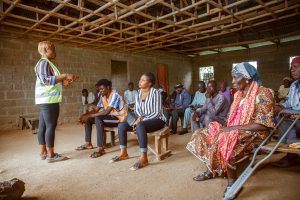Six Ways the United States can Lead by Example on Open Government
In 2011, President Obama co-founded the Open Government PartnershipThe Open Government Partnership (OGP) is a multi-stakeholder initiative focused on improving government transparency, ensuring opportunities for citizen participation in public matters, and strengthen... More (OGP) with world leaders from seven other democracies. Over a decade later, the United States has yet to reclaim global leadership and public trust through delivering on transformative, ambitious transparencyAccording to OGP’s Articles of Governance, transparency occurs when “government-held information (including on activities and decisions) is open, comprehensive, timely, freely available to the pub... More and accountability reforms co-created with the American people.
Despite the meaningful steps the Biden-Harris administration has taken over the past two years, however, from restoring press briefings to disclosing taxes and visitor logs to pursuing an anti-corruption strategy, this White House has failed to “seize the moment” by adopting the key recommendations from an OGP report that the White House highlighted in 2021 and revived open government as a principle, practice, or set of coherent programs, policies, and personnel working together across federal agencies.
This ongoing void in presidential leadership, transparency, accountability, when considered alongside ongoing lack of involvement of the judicial branch, legislative branch, press, and public, means that the United States cannot be credible internationally until it sets our own house in order domestically.
Following are six concrete steps that President Biden can order this week to build on in the foundation he and President Obama laid a decade ago.
Host open government roundtables in person in Washington, D.C., streamed live to everyone in the USA. This tentative schedule for public engagement posted at open.usa.gov is an exercise in unaccountability. Delivering on hybrid roundtable would meet a key public participation commitment in the fourth action planAction plans are at the core of a government’s participation in OGP. They are the product of a co-creation process in which government and civil society jointly develop commitments to open governmen.... Previous parallel engagement around equity is laudable, but not a replacement. This was a huge contrast to the resources deployed for the Summit for Democracy. OGP will continue to fail in the USA as a meaningful platform for change until this shifts.
Make 2023 roundtables meaningful by co-creating new commitments that reflect the priorities of good governance groups, as expressed at BlueprintForAccountability.us. We don’t need more “virtual listening sessions.” We need in-person co-creation workshops where civil society priorities are given equal weight and prominence in commitments. There is a key precedent for doing so in the third action plan, to which the Obama-Biden administration added new commitments. The Biden-Harris administration can and should do the same ahead of the OGP Summit to demonstrate renewed U.S. leadership.
Lead by example with a restored wh.gov/open that highlights the excellent ongoing work of officials and civil servants across the U.S. government. Bright spots might include the Office of Information and Regulatory efforts to improve public participation in rulemaking, the General Service Administration’s efforts on open innovation at Challenge.gov, the Opportunity Project at the Census Bureau, or Secretary Mayorkas’ recent recommitment to open government at the Department for Homeland Security.
Make an agency and public official accountable for each commitment. Post ongoing updates at agency.gov/open with contact information so that the press and OGP IRM researchers can find someone to talk about each. For instance, the Department of Justice should be publicly accountable for its lack of progress on the commitment to stand up an open database of law enforcement misconduct, as President Biden ordered be launched by January 20, 2023 – not the end of the year.
Begin tracking progress on each commitment on a dashboard at wh.gov/open/dashboard. Update the press and public using official White House social media channels and press lists each time there is a change. A field for each commitment is useful, but the American people should be able to see at a glance the status of all commitments, past and present, and hear about progress from our elected officials.
Create a Federal Advisory Committee for open government modeled on the President’s Council of Science and TechnologyMaintaining the integrity of the scientific process — through open science, training, and rigorous evaluation criteria — is critical to ensure accurate health policy and strong public trust in gov... (PCAST). This new committee would be accountable for tracking progress on implementing OGP, Summit for Democracy commitments, and relevant federal laws like the Open Government Data Act, FACA, & FOIA. The President should formally charter and fund such a committee, appointing both civil society and government members. The “President’s Council for Open Government” would help to move all the federal government’s considerable efforts on transparency, accountability, participation and collaboration from the opacity of background briefings and workshops, adding sunshine and engagement around delivery necessary to rebuild trust.
If there isn’t a sea change in how the administration approaches open government, it will erode U.S. foreign policy globally and American democracy domestically. The President will fumble a golden opportunity to rebuild public trust in the U.S. government after decades of steady erosion. Otherwise, our government runs the risk of being seen as openwashing, instead of restoring U.S. leadership through the power of our example.
In 2023, the future of the Open Government Partnership still depends on White House leadership. We need President Biden and all of his cabinet to lead through the power of our example, standing with transparency champions from around the United States to co-create a fresh slate of commitments prior to the Summit that are representative of civil society priorities and proportionate to our nation’s urgent needs, from surveillance and classification reform to creating a world-class freedom of information system to delivering on beneficial ownershipDisclosing beneficial owners — those who ultimately control or profit from a business — is essential for combating corruption, stemming illicit financial flows, and fighting tax evasion. Technical... More and police misconduct databases.
Comments (1)
Leave a Reply
Related Content

2023 Government Steering Committee Elections

United States
The United States fifth national action plan is extensive; addressing a wide range of relevant public policy issues. However, it has overall limited potential to achieve significant change in government…

The Skeptic’s Guide to Open Government – 2022 Edition
Evidence continues to show that open government affects people’s lives. But there are still skeptics who are not aware of all the benefits associated with this approach. Use this guide…


Bouzid Samir Reply
Exactement, nous avons besoin que le président Biden et l’ensemble de son cabinet montrent la puissance de notre exemple, se tenant aux côtés des champions de la transparence de partout aux États-Unis pour co-créer une nouvelle liste d’engagements avant le sommet qui soient représentatifs des priorités de la société civile et proportionnés aux besoins urgents de notre pays, de la réforme de la surveillance et de la classification à la création d’un système d’accès à l’information de classe